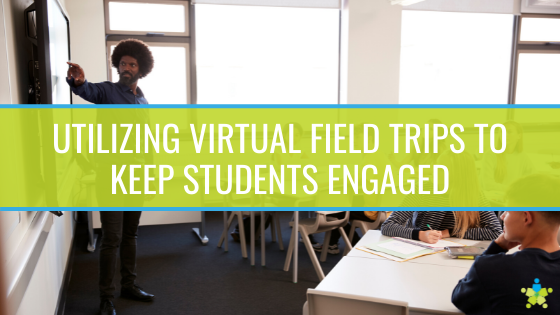[vc_row][vc_column][vc_column_text]The demand for virtual field trips in the education industry has skyrocketed since many in person field trips have been put on hold due to the coronavirus pandemic. Although students are becoming accustomed to distance learning from home or in hybrid classroom environments, their thirst for learning about other people, places, and cultures has not diminished, and virtual field trips are meeting this need in record numbers.[/vc_column_text][/vc_column][/vc_row][vc_row][vc_column][vc_column_text]
Virtual Field Trips for Almost Any Subject
There is something to be said for the in-person interaction of a real field trip, but due to expenses and travel it frequently limits teachers and students to locations within a relatively short driving distance from the school. With many popular field trip destinations across the nation and the world, allowing field trips online is affording educators and the children they teach a unique look at places and people they might not previously have had the opportunity to visit or hear from. Virtual field trips are available for almost any subject. Here is a good starting place for teachers that may be struggling with ideas:[/vc_column_text][vc_row_inner][vc_column_inner width="1/3"][vc_column_text]Math:
National Museum of Mathematics, meet with an Engineer, and find out more about why math is important for these types of careers
[/vc_column_text][/vc_column_inner][vc_column_inner width="1/3"][vc_column_text]English:
Plays, author readings
[/vc_column_text][/vc_column_inner][vc_column_inner width="1/3"][vc_column_text]Social Studies:
Museums, historic locations such as Ellis Island, the Sistine Chapel, the Roman Colosseum and more
[/vc_column_text][/vc_column_inner][/vc_row_inner][vc_row_inner][vc_column_inner width="1/2"][vc_column_text]Science:
Zoos, wildlife safaris, aquariums, planetariums, NASA, national parks, Smithsonian’s National Air & Space Museum, meet an actual scientist or other professional in the field
[/vc_column_text][/vc_column_inner][vc_column_inner width="1/2"][vc_column_text]Fine Arts:
Museums, Broadway shows, ballet companies, The Louvre, chat with an artist and watch them produce a piece of art, meet with a musician
[/vc_column_text][/vc_column_inner][/vc_row_inner][vc_column_text]The sky can be the limit for educators as they plan out their curriculum and look for ways to incorporate virtual field trips and make learning come alive for their students.[/vc_column_text][/vc_column][/vc_row][vc_row][vc_column][vc_column_text]Types of Virtual Field Trips
Just as in-person field trips offer guided tours or the option of self-exploration, virtual field trips also offer educators several options, usually in one of the following formats:- Self-guided: This option entails a teacher planning a virtual field trip, from the destination to the stops the class will make, to the exhibits they will dive into deeper. This generally requires the teacher choosing a day and time that works best for them without too much effort given to schedule coordination. Google Tour Creator can be a great place to begin for a self-guided tour.
- Live-guided: Some virtual destinations are offering live guided tours which means someone is leading the tour in real time and may also offer a short question and answer session that allows the teacher and students to interact directly with the tour guide. This may require a greater degree of planning to ensure a time can be found that works for all involved parties, but it is well worth the effort.
- Chat with an Expert: This could be any field of interest that helps students identify with potential career paths.
Benefits of Taking Virtual Field Trips
While educators and students alike have been challenged by the obstacles of learning in virtual or hybrid classroom environments, many have been able to find a silver lining in the form of virtual field trips as some of the unique benefits can include:- Exposure to people, places, and events across the nation and world
- Inspiration for students being curious and learning more
- Cost effectiveness as most are free or heavily discounted compared to an in-person trip
- Increased participation because it does not require travel
- Focus on subject matter instead of keeping track of children as you progress through an exhibit
- Complimenting the field trip with activities, games, and other supplemental learning experiences in the curriculum
- Giving new life to a more traditional concept
What Educators Need to Take Virtual Field Trips with Students
An integral component of virtual field trips is having access to the right equipment to make it all happen. To make the adventure a true success, it will take a lot more than just screen sharing. The top three things needed for a successful virtual field trip in a virtual or hybrid classroom environment include:- Platform. The platform is how the educator will access the information. For many teachers this often takes the form of Zoom or Google Tour Creator. Whichever platform is chosen, the educator and students should be able to log in. Depending on the platform used, most offer the option for a teacher to mute the students unless they either turn that feature off or call on a student.
- Camera. The camera is key when it comes to participation. Having the right type of camera in place allows students to be able to communicate with the teacher and tour guide, if there is one. It allows for a more interactive experience that is likely to leave a lasting impression.
- AV Integrator. An AV integrator can be a huge asset for educators as they can install and maintain the necessary components for a virtual field trip. These professionals can work with a school’s budget to make the field trip a seamless possibility.



